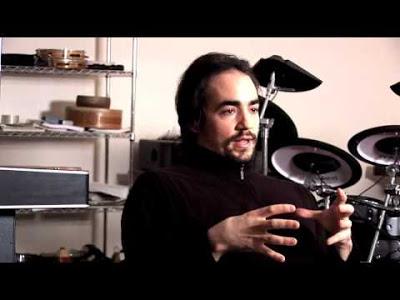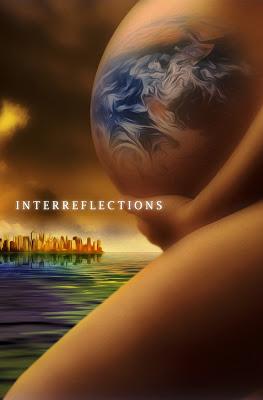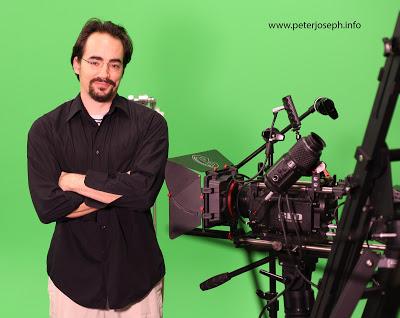
Awaiting Interreflections…
Peter Joseph’s highly anticipated new film series inches towards its 2016 release.
By Alex Simon
In a time of great social strife and growing inequality and public outcry, it’s no wonder Peter Joseph's work has gained more and more prominence in the counter-culture each year. Love him or hate him, Joseph continues to challenge the “zeitgeist”, leading the charge towards a new society. Art is his weapon… and the thousands of dedicated fans don’t hurt either.
Peter Joseph is a producer who created the Zeitgeist Film Trilogy, a series of films critical of society and culture. These works exploded online starting in 2007 with millions of views and can now be found in major media outlets such as Netflix. His third film, Zeitgeist: Moving Forward, had the largest grassroots, non-profit theatrical release in history, with almost 350 screenings in 60 countries in 25 languages. While I may not agree with everything in his films, I certainly appreciate being exposed to it as they are designed to create critical thought.
When he is not creating films, he is doing research on culture and ecological sustainability. Apart from his ongoing media creations in support of such social issues, he works with a global community of engineers, artists, activists and scientists in pursuit for a new, more human social arrangement for the world's population.
Born in Winston-Salem, NC and trained as a classical musician, Joseph moved to New York City to attend the New School for Social Research as a percussion major, only to drop out years later. For the next decade, he worked in advertising as an art designer and in Wall St as a private equity trader. The son of two civil services workers, Peter sources his mother’s social work as his first awareness of the problems of social inequality and the “structural violence” inherent to poverty.
As the founder of The Zeitgeist Movement, a global non-profit with thousands of members, Joseph has lectured widely and a quick internet search shows endless of hours of radio, TV and podcast interviews. He is also on the board of Project Peace on Earth and works in support of the Occupy Movement.
While his prior work media explored a vast range of social issues via traditional style interviews with experts, his new film InterReflections I, leaves the documentary style behind and instead explores an experimental approach that encompasses fantasy, abstraction and a mixed film genres.
Peter Joseph sat down recently to discuss his past, present and future. Here’s what transpired:

How did your mother’s social work influence your own work and future activism?
My mother worked in rural North Carolina with the extreme poor, a social condition full of abuse, apathy and desperation. I learned from her that the chain reaction set in motion by poverty was the greatest crime against humanity in existence. We have been groomed to think there is an “equal playing field” and “you get what you work for” in the current economy - and that is the great American (and now global) myth. Our society is predicated on this pervasive “naturalist fallacy” that some win, some lose and those who make it deserve it. We assume this is the natural order of things on the economic level when it is actually a societal contrivance. The truth is that those who actually make it out of poverty into affluence are the exceptions that prove the rule. The system is designed to keep the poor being poor and to keep the rich being rich and learning about the generations of physical and psychological abuse/suffering that is spawned from the precondition of poverty revealed to me that we live in a system of convert structural oppression. It isn’t a conspiracy. It is simply how the society has evolved over generations through tradition.
You had an unusual path after dropping out of the conservatory.
After dropping out of the music conservatory I made my way into the advertising medium. It was one of the few viable job roles I could find that allowed for music composition and some sort of artistic creation. My personal musical performance interests in college were too abstract and even then I didn’t want to pollute the art form with the constant search for paid gigs. However, as the years went by working in the NYC advertising scene, the more unbearable it became. There is something wrong in a culture where a company spends more on marketing than on the actual building and design of a product, which is often the case today. It shows that the market game cannot be based on the idea of the “informed/educated citizen” making “rational choices” - for the goal of marketing is not to inform but to psychologically coerce, manipulating our deeply social human nature. It convinces us to think our status and personal sense of success can only be tied to a good or service and, the sad fact is, the more people who succumb to these artificially created “needs”, the more other people tend to succumb and a feedback loop is generated. Hence the term “fashion trend”.
Beyond that, I also couldn’t stand the dictatorial nature of the corporate hierarchy itself and hoped for some kind of job role that didn’t have a boss or a client. At that stage, I really didn’t care what the new job was. I just wanted to be free. So, I looked around and noticed private equity trading. So, for six years I traded from my own account learning a great deal not only about the stock market but market economics in general. I spent about 3 years in private mentorship with professional Wall St. traders. In the end, this experience forced a realization about the true nature of the market economy: it doesn’t matter what it is that one sells, as long as there is another to buy it and the reasons they buy it are meaningless. It is a parasitic concept, masked, once again, by the idea that everyone is equally as informed about what they are doing and hence no one can be blamed for any given outcome.
It’s hard to picture someone like you working on or with Wall Street.
In this, the stock market is perhaps the lowest common denominator of what the market economy is and does, moving trillions of dollars while literally selling nothing tangible. The whole thing is pointless in and of itself. You could eliminate the entire investment/trading exchange network and it would make no difference to the world economy in principle function as the market doesn’t create anything - it just exploits price imbalances. The stock market even let’s one gamble on the decline of a company, currency or derivative. It has no loyalty to human progress and the fact a person can make a million dollars off the failure of a country’s currency, for example, shows the heart of the sickness. And this game now rules the financial world – hence the 2007 housing market crash. Anyway, in hindsight, if I did not engage in this world, I would never have learned about economics, which lead to my more core activist focus today, which is a total change in the global economy, away from the market itself.
You really made a splash with the Zeitgeist Film Series. Tell us a bit about that.
Over 250,000 people have seen the Zeitgeist Film Series. It started with a performance piece I did in lower Manhattan in 2007. The production was simply called Zeitgeist at that time. After the free event finished its run, the video portion was tossed online via Google Video (which is no longer around) under the title Zeitgeist: The Movie. I never promoted it or thought anything of it at that point. I didn’t know what a “viral” video was. In fact, I didn’t even own most of the footage. But then, somehow, it went super-viral with 50 million views in the first year. Shocked and now with a large following, I then made a sequel called Zeitgeist: Addendum in 2009 and then closed the series as a trilogy in 2011 with Zeitgeist: Moving Forward. The films are now distributed in large scale, globally in various mediums, including Netflix.
 Peter Joseph in his studio.
Peter Joseph in his studio. Then, in 2011, you started the Zeitgeist Media Festival.
Right. While related to The Zeitgeist Movement, this arts-based event experiment has transcended with a life of its own. The annual event takes place in Hollywood California in the fall of each year. We feature films, live performance, comedy and multimedia, each with an expression in support of a cause or gesture of human well-being/unity. I believe communication needs a balance – part art – part science. I think breaking the shackles of dogma and tradition requires more than logic and reason - it requires aesthetic. To sneak behind people’s ego. Notable figures who have been booked at an event include actor Rutger Hauer, writer Tim Kring, author Marianne Williamson, Billy Gibbons (“ZZ Top”), Rick Overton, Lee Camp, Mear One, IN-Q, Sussan Deyhim and many more.
Who are some of your biggest influences when it comes to social theory?
While there are many influences, my oldest influence when it comes to social theory has been Buckminster Fuller, inventor of the Geodesic dome. Fuller has still made the greatest foundational design contributions of any engineer when it comes to philosophy, focusing on what true efficiency means and how the current system doesn’t facilitate it by its current methods. This core activist focus builds upon the work of many like Fuller and, in short, it is the promotion of what could be termed a “post-scarcity” economic model. This is not as utopian as it sounds. It is a gesture of focus. Obviously nothing is infinitely abundant - even the sun will burn out – but the problem with the current system is it is focused on scarcity, as scarcity is the most profitable condition, if maintained correctly. There is no incentive for abundance in the world economy. If there was one, there would be no need to price or generate service. For example, it was only when water pollution occurred we started bottling water -and now bottled water is a billion dollar a year industry, employing many. This is important because the truth is that through modern technology we can create a degree of abundance that can satisfy the world population’s needs many times over. We don’t do it because it isn’t profitable, making all the charity organization a waste of time and effort. Poverty simply can’t be solved in this type of system. Hence, a system focused on abundance (post-scarcity) is needed.
Tell us about the InterReflections Trilogy.
With the first of the series due for release in 2016, the InterReflections Trilogy is a live action, experimental idea I have been working on for about 5 years now. Taking place in three time frames, the first of the trilogy establishes an experimental vocabulary that will define the style of the three-part series as a whole. The films mix together elements of documentary, science fiction, drama, musical, thriller and dark comedy, embraced in a gesture of film noir, InterReflections attempts to show the audience just how twisted modern “normality” really is, defending the films’ aesthetically driven social criticism by intellectually putting the audience in the position of future hindsight. The project takes critically important social themes, from human oppression/inequality to environmental destruction, and aesthetically molds a perspective of humanity’s folly (and potential) that likely remains outside of the awareness of most people.
It sounds unlike anything we’ve seen before.
If I was to compare the production style, for those who have a film background reading this, I would say it will unfold like Sin City did, but without the comic book style. This kind of work is nothing new in Hollywood production, but again, such technical rigor is rare for those who don’t have millions of dollars. Specifically, the film is being shot in 6k, via Red Epic Dragon/Red system, and the workflow will incorporate Foundry and Adobe program sets. It will be released theatrically, and then VOD. Eventually it will be online for free, like all my media.
Do you feel that film provides a unique avenue for self-expression and communication, unlike any of the other seven arts?
As a filmmaker, I have changed my view regarding what really inspires people and I feel the 'abstract arts,' - rather than mere cold academic info, hold a powerful place in changing people's worldviews. We can tell people technical data all day long and some will absorb it... but the arts have a mysterious way of sneaking behind people's values and planting seeds for new ideas. I try to walk the line between art and intellect, academia and poetry.
